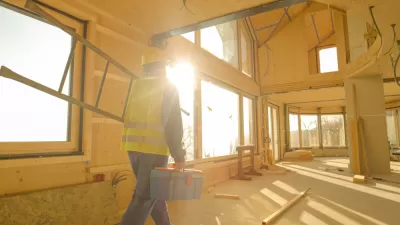Julie Stern reports on a presentation by NYU professor Eric Klinenberg, who says that the number of people living by themselves in the United States is growing and is having an impact on city life.
In his recent keynote presentation at an Urban Land Institute Terwilliger Center for Housing forum, NYU sociology professor Eric Klinenberg describes the growing trend of people living individually. He notes that the percentage of U.S. households with only one person was less than 10% in 1950, but is now 27.6%.
Klinenberg says that the rise of "singletons," not to be confused with "singles," who may live with family or roommates, does not mean an increase in lonely or asocial people. Julie Stern summarizes, "[P]eople who live alone are more likely than married people to take advantage of urban amenities, to go out at night, to attend public events and engage in other activities that ‘animate the streets.'"
The four biggest influences on this trend, according to Klinenberg, are "[w]omen's economic independence," the pervasive use of social media, "[t]he rise of cities--and of neighborhoods within cities," and growing number of people aging alone.
FULL STORY: Solo Cities: How “Living Alone” Is Changing Urban America

Planetizen Federal Action Tracker
A weekly monitor of how Trump’s orders and actions are impacting planners and planning in America.

Maui's Vacation Rental Debate Turns Ugly
Verbal attacks, misinformation campaigns and fistfights plague a high-stakes debate to convert thousands of vacation rentals into long-term housing.

San Francisco Suspends Traffic Calming Amidst Record Deaths
Citing “a challenging fiscal landscape,” the city will cease the program on the heels of 42 traffic deaths, including 24 pedestrians.

Amtrak Rolls Out New Orleans to Alabama “Mardi Gras” Train
The new service will operate morning and evening departures between Mobile and New Orleans.

The Subversive Car-Free Guide to Trump's Great American Road Trip
Car-free ways to access Chicagoland’s best tourist attractions.

San Antonio and Austin are Fusing Into one Massive Megaregion
The region spanning the two central Texas cities is growing fast, posing challenges for local infrastructure and water supplies.
Urban Design for Planners 1: Software Tools
This six-course series explores essential urban design concepts using open source software and equips planners with the tools they need to participate fully in the urban design process.
Planning for Universal Design
Learn the tools for implementing Universal Design in planning regulations.
Heyer Gruel & Associates PA
JM Goldson LLC
Custer County Colorado
City of Camden Redevelopment Agency
City of Astoria
Transportation Research & Education Center (TREC) at Portland State University
Jefferson Parish Government
Camden Redevelopment Agency
City of Claremont




























